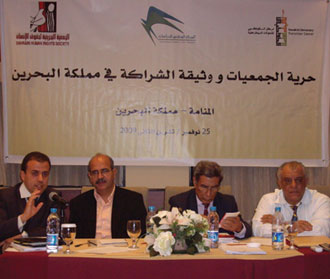Symposium Criticizing the Associations Bill
On 25 November 2009, the Bahraini Human Rights Society and the
Kawakibi Democracy Transition Centre jointly organized a seminar
on the freedom of societies in Bahrain, during which participants
discussed a bill which the Government had recently presented to
the Parliament. The participants saw this bill as a setback from
 |
Law No. 89 as it includes new restrictions, such as the random inspection
of societies’ headquarters without previous notice. They also concluded
that it was necessary to make new proposals in order to develop
this bill, which is still under discussion in the House of Representatives.
This seminar came in the context of a project conducted by Al Kawakibi
Democracy Transition Centre to study the adherence of members participating
in the Forum for the Future Project. Mr. Amin Ghali, member of the
Centre, said that the seminar aimed at assessing the performance
of societies and the adherence of governments to the commitments
outlined in the Sea Island Declaration.
Salah Al Jorshi presented his assessment of civil society organizations
in the Arab World, and noticed a decline in their contribution to
the Forum for the Future, explaining that the reason for this decline
was the objection of some Arab regimes. Al Jorshi also criticized
the performance of these societies saying that there are approximately
300 thousand Arab associations, but their effectiveness is very
minimal when compared to their counterparts in Asian countries.
Abdulnabi Al Ekri and Zainab Al Drazi presented a research study
regarding the bill, and said that some of its articles are inconsistent
with the Constitution which guarantees freedoms, and added that
the bill was based on the provisions of the Anti-Terrorism Act.
The study showed the extent of concern within civil society institutions
who are subjected to bad treatment by the Ministry of Social Development,
which has sweeping powers in dissolving the management of associations,
as when the Ministry had administratively dissolved the management
of the Nurses’ Association and placed it under its direct supervision.
According to the study, the most dangerous phenomena facing civil
society organizations is sectarian polarization, which has penetrated
political and social life and instead of promoting citizenship and
national unity, has become a factor in weakening national identity
and promoting other affiliations.
|



